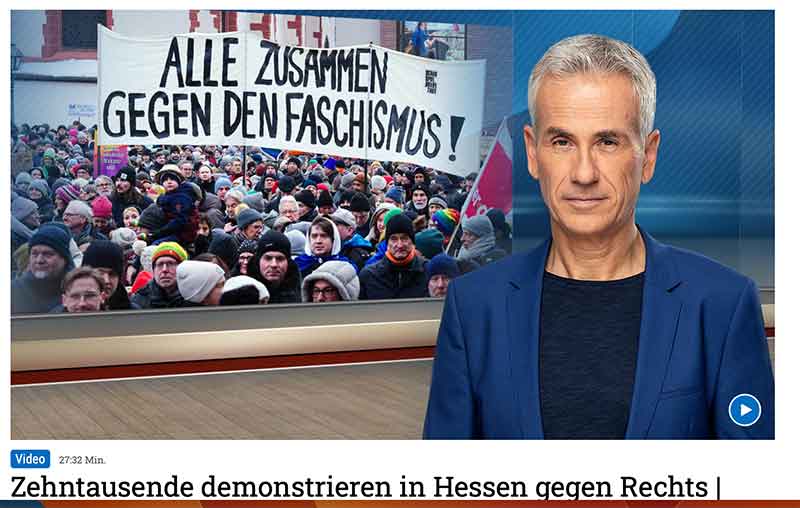by Thomas Klikauer and Danny Antonelli

A recent study revealed that there is an increasing desire for an authoritarian leader in Europe. As if Europe’s far-right, adjacent Neo-Nazis, and Europe’ illiberal (read: authoritarian) regimes like Hungary, Turkey, potentially Italy and Dutch Tulip Fascism aren’t already active enough in that direction.
It depicts a rather a depressing, if not gloomy future for democracy in Europe.
The basic problem is that authoritarian attitudes are gaining strength in Europe. Almost self-evidently, Germany is also plagued by a seemingly unstoppable rise of the far-right. Because irrationality is having its “15 minutes of fame,” it seems that more and more people in Europe want the democratic system to be replaced with an authoritarian form of government.
Besides eastern Germany, this is especially the case in southern Europe. In Italy, but also in France, the mood is depressing if you are in favor of democracy. The same can be said about Eastern Europe.
However, in Germany only a relatively small part of the electorate holds staunchly authoritarian views. Yet authoritarianism is becoming a growing problem in Germany as well. This is confirmed by a large-scale survey carried out in eight European countries.
The study surveyed 2,000 people in Germany, France, Italy, Great Britain, Poland, Austria, the Czech Republic, and Hungary. According to the results, democracy is in trouble in Italy and France, where more than 40% want an authoritarian ruler. In Germany and Austria these numbers are significantly lower.
In a previous survey (2019), 13% of Germans supported a “strong leader”. By 2022, it had gone up to 17%. Worse, the number of people opposed to authoritarianism decreased by 5% from 44% to 39%. In other words, Germany and Austria have increasingly fewer democrats and more people seeking a far-right Führer.
With recent far-right election successes in Italy, Sweden, the Netherlands, etc., dark clouds are forming over parliamentarian democracy. Even more problematic, these numbers support a global trend set against democracy.
Putin’s anti-democracy paid propaganda puppets are doing a good job apparently, like the AfD politicians and others recently outed in the Voice of Europe investigations.
It is striking that in all countries that were examined, approval of a strong leader is increasing. Meanwhile, the aforementioned lower approval rate for a strong leader in Germany and Austria can perhaps be explained through the use of the term “Führer”. In the German language, the word “Führer” has a connotation which is very different from the English word “leader”.
In Germany, the direct translation of the word “leader” is “Führer” and that equates the word with Adolf Hitler. Asking someone to support a strong “Führer”, for example, means asking someone to support Adolf Hitler, the Führer. Given recent history, many people are likely to say “no”, especially since all visible and verbal associations to Nazism are forbidden in Germany.
Despite such linguistic wordplay, dictatorships and right-wing extremism are on the rise. Currently, far-right parties and their politics are becoming ever more popular, and this includes right-wing populists.
Nevertheless, the development is most alarming in Germany – a country with a Nazi past and an active far-right on the march.
Such findings are also supported by one of Germany’s most famous studies on authoritarianism: the “Mitte Studies” of Bielefeld University and the Friedrich Ebert Foundation.
The Mitte Study also shows that the number of people who want a dictatorship instead of a democratic republic has increased significantly. The same can be said for people with a far-right worldview.
The pro-democracy movement has recently shown its strength as hundreds of thousands, if not millions, of people took to the streets in Germany in recent country-wide anti-far-right mass rallies. These mass rallies have sent a strong message to the right-wing extremist AfD, the far-right in general and for democracy.
Many people, however, still ask if this will be enough to stop the threat of Germany moving to the right. It might. Since massive revulsion against the right-wing plan to deport non-Germans and the non-integrated, the AfD is losing ground, slipping from above 20% of voter support to 16%.
Most recently, a perfidious far-right/Neo-Nazi/AfD plan for a so-called “remigration” (read: forced deportations) came to light. The neo-fascist hallucination is to create a new master race. It was planned at a secret Potsdam meeting.
The meeting was organized with the eyes of Germany’s far-right focused on recent election successes of the right-wing extremist AfD. As they got stronger, there was a notable increase in verbal and physical attacks on minorities and on democracy. These attacks revealed to the general public that Germany’s democratic society is in serious danger.
According to the Europe-wide study, democratic political parties and democratic politicians do not enjoy a good reputation. In all eight countries, more than half of the respondents supported the statement that “most politicians only care about the interests of the rich and powerful”.
In the UK and Italy, this statement is supported by almost two-thirds of the respondents. In Germany, a little more than half of the respondents agreed with the statement.
Ironically enough, it is the Russian and American right-wing oligarchs who finance the disinformation campaigns that turn people against their own democratic leadership.
Of course the neoliberal business agenda has been working toward a new Golden Age for the “Masters of the Universe” since Reagan, Thatcher and Kohl came to power in the late 1970s and the 1980s.
One reason for the frustration with parliamentary democracy can be seen in how many people agree with the statement, “people like me have no say in what the government does”. In all countries, this statement is shared by more people than those who disagree.
In Germany, 45% of respondents believe that they have nothing to say. If one adds those people who “partially agree” to “people like me have no say in what the government does” the number goes up to three-quarters of the respondents.
Support for authoritarian ideologies affects not only the form of government, but also the practical work of democratic politics. For example, the survey also asked whether “the state should lock up potentially dangerous people”. A relatively high number of people in all countries support this idea:
- in Germany, 41% are of this opinion – a little bit more than three years earlier;
- in Italy, the approval for this reaches a whopping 57%;
- in the UK, on the other hand, only a minority of just 17% hold such a view.
The idea of locking up “potentially dangerous people” – without specifying who exactly these dangerous people might be – is a core element of right-wing populists that all too often transforms fear into hatred.
One of the typical demagogic master orators for this type of stochastic terrorism is Germany’s far-right and Neo-Nazi Björn Höcke who, after a 2019 court ruling can legally be called a “fascist”.
Meanwhile in Italy, there are noted similarities between Italy’s current government and the authoritarianism of master demagogue Benito Mussolini – the fascist dictator of Italy who came to power in the 1920s and was finally found and executed on April 28, 1945.
A far-right populist leader is able to bring about a kind of alchemical transformation of fear into hatred by implementing points 5 and 6 of Umberto eco’s Ur-Fascism.
Much of the success of fascism (then) and neofascism (today) comes from the simple-minded idea that everything can be traced back to one single issue: the invented enemy.
This is the far-right hallucination that any stranger is the enemy. This enemy is then framed as the intruder who comes from outside or already has infiltrated the country and lives a parasitic existence on the inside.
This conforms with Umberto Eco’s point 5: “Ur-Fascism grows up and seeks for consensus by exploiting and exacerbating the natural fear of difference. The first appeal of a fascist or prematurely fascist movement is an appeal against the intruders. Thus Ur-Fascism is racist by definition.”
For the far-right, such an alien intruder can be killed and so the problem is solved. A case in point is Germany’s AfD apparatchik Beatrix von Storch, who in 2016, fanned the flames of hate by saying that “police should be allowed to use weapons against women and children who enter Germany illegally.”
Storch’s grandfather was the top-Nazi von Krosigk (Hitler’s finance minister until Germany’s defeat in 1945). Perhaps killing innocent women and children comes “naturally” or through genes to some people.
Meanwhile, back in Europe and since the first survey on European authoritarianism (2019), various crises have hit many people:
- There was the corona pandemic – Covid-19. Its impact changed the realities of many people’s lives. Some Germans still talk about a Corona-dictatorship – that never happened.
- Next, there was Russia’s war against Ukraine which began in February 2022. This war and destruction led to rising energy costs, a sharp increase in the cost of living, and cranking up inflation.
- All of this was made worse by a generally gloomy outlook for the economy as well as a growing sense of insecurity.
Especially from an economic point of view, it is clear that many people have seen their own situation deteriorate in the last year or so. Against this background, the survey noted many changes compared to the 2019 survey.
In general, interest in politics has decreased in some countries and increased in others over the years, with the latter including countries in Central and Eastern Europe such as Austria, Poland, the Czech Republic and Hungary.
Support for the statement that “a person has no influence on the government” has slightly increased in all countries, with the surprising exception of Hungary and the Czech Republic. For example, in three out of eight countries – United Kingdom, Czech Republic, and Italy – more than 50% of people fully or partially agree with the statement.
The statement that “democracy is the best form of government, even if it brings problems”, received approval in all countries. Yet regional differences can also be observed. Three post-socialist countries as well as the United Kingdom gave this statement lower approval ratings than the other countries.
There is also Europe-wide divergence on the level of satisfaction with the functioning of democracy. Relatively high satisfaction with the function of democracy in their own country can be found in Germany, France, Austria and the Czech Republic.
Virtually all of this is broadly in line with the recent Leipzig Authoritarianism Study which is conducted every two years. Surprisingly, and despite the rise of the far-right in Germany, satisfaction with democracy has increased in recent years. On the downside, the desire for authority has also increased.
It appears as if – then as today – there are two Germanys. There is the Germany of Kant, Hegel, Einstein, Bach, Beethoven, Gustav Stresemann, Willy Brandt, Rosa Luxemburg, Hannah Arendt, Sophie Scholl, and Marlene Dietrich on the one side.
And on the other side, there is still support for the dark side of Germany and the quest for an authoritarian Führer of the likes of Ludendorff, Hitler, Himmler, Eichmann, Goering, Goebbels, and today, for, for example, the AfD’s most powerful Führer: Björn Höcke.
Far-right forces have gained momentum in Germany because they like to say that people “must be against “rotten” parliamentary governments. … Wherever a politician casts doubt on the legitimacy of a parliament because it no longer represents the Voice of the People, we can smell Ur-Fascism.”
And so the people are fed poison fruit; the result is a decreasing satisfaction with democracy and a growing authoritarian tendency in the midst of German society.
Then as today, German authoritarianism attracts the petit bourgeois middle-class, “a frustrated middle class, a class suffering from an economic crisis or feelings of political humiliation, and frightened by the pressure of lower social groups.”
On the positive side, there is also a growing historical awareness among Germans. On the negative side, there is also the idée fixe that discussions about the Holocaust should be ended.
Some people think the past should be relegated to the past and Germans should no longer be reminded of their past failures. Perhaps the idea behind that is to make the philosopher George Santayana’s statement a reality:
“those who cannot learn from history
are doomed to repeat it”
Of course, today’s European far-right and adjacent Neo-Nazis are only too happy to have history repeat itself while they dream of a new Führer. The far-right hope – and it is clearly being put into law and into “non”-education in the USA – is that the less people are educated about history, the better. Even Donald Trump loves the poorly educated.
The idée fixe to forget the past has increased slightly in Le Pen’s France, the AfD’s Germany, and in Meloni’s Italy. It has decreased slightly in Austria and Poland and has remained about the same in the Czech Republic and, surprisingly, also in: Hungary.
In all countries, the approval of the statement that “the country benefited from the opening of borders” has decreased as the right-wing’s “politics of fear” works its way.
Support for this is particularly low in Italy (30%) and France (33%). It is also declining in the Eastern European countries. Predictably, in Viktor Orbán’s Hungary, for example, it is particularly low.
The same can be said about Orbán’s prime ideologies: anti-Semitism and Islamophobia. Interestingly, in all countries there is a big difference in terms of support for the right to build synagogues compared to the right to build mosques.
People tend to agree with the statement about “the right to build synagogues” much more often than “the right to build mosques.” It turns out that the recognition of the contribution of Jewish people in all countries is significantly higher than that of Muslims. Meanwhile, there is a noted increase in Islamophobia in France.
In the end, there is a mixed bag of different attitudes in Europe. This is nothing new. However, virtually all of what is outlined above is in line with a global trend that is set against democracy.
Worse, there is a Europe-wide trend towards authoritarianism and the longing for a new Führer. But amidst all that doom and gloom, one should not forget that support for an authoritarian Führer – still – comes from a rather small section of people in most European societies.
These are the people who feel deprived of a clear social identity and only have one thing in common: they are all born in that country and so feel the need to protect the only social identity they have left.
Recent polling in Germany, for example, has the far-right AfD at 16% – down from above 20%. In the Netherlands, Wilders’ plan to establish “tulip fascism” appears to have failed. In Poland, the religious-fundamentalist right lost the last election.
In the UK, the Tories appear to be on the way out where 47% might vote Labour and only 20% might vote for the Tories.
In the end – and despite the disquieting results of the survey outlined above and the sustained attacks on European democracy by Europe’s far-right, neofascists, Neo-Nazis, and right-wing populists – the vast majority of people in Europe are not looking for a new authoritarian Führer.
Making clear to those who suffer from cognitive dissonance that they are members of a death cult (a motto of the Falangists was Viva la Muerte) is extremely difficult since among these people “there can be no advancement of learning. Truth has been already spelled out once and for all, and [they] can only keep interpreting its obscure message.”
Reminding them visually over and over again that Mussolini was brutally killed and hanged upside down and Hitler blew his brains out in a bunker just might one day bring reality into sharper focus.
Born on the foothills of Castle Frankenstein, Thomas Klikauer is the author of over 970 publications including a book on Alternative für Deutschland: The AfD – published by Liverpool University Press.
Danny Antonelli grew up in the USA, now lives in Hamburg, Germany and writes radio plays, stories and is a professional lyricist and librettist.

















































